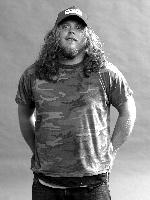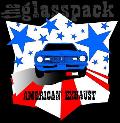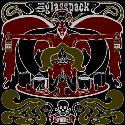social bookmarking tools:
 |
|
| Available RSS Feeds |
|---|
 - Top Picks - Top Picks |
 - Today's Music - Today's Music |
 - Editor's Blog - Editor's Blog
|
 - Articles - Articles
|
Add Louisville Music News' RSS Feed to Your Yahoo!
|

Glasspack:
The Drive for Success
Do you know about Louisville's rock n roll construction crew? The band that's named after a hotrod muffler that makes a car's engine sound like a jet engine? The Glasspack wants you to know. Rev up your engine and take your loudest, larynx-destroying voice to the cavernous locale of your choice. YELL out music related names like Blue Cheer, Jimi Hendrix, MC5, The Misfits, The Butthole Surfers, or Fu Manchu. The bluegrass echo most likely to resound is "THE GLASSPACK."
We all know of bands with names inspired by a high school gym teacher named Leonard Skinner, getting the news from talking heads and Flint, Michigan's Grand Trunk Railroad. Read on - if you feel brave - and learn about the thunderous music of the Louisville rumblers called The Glasspack.
Sonic Affect
With influences like the aforementioned bands, as well as Iggy and The Stooges; Creedence Clearwater Revival; Black Sabbath; Canned Heat; John Lee Hooker and Queens of the Stone Age, The Glasspack is a Bluegrass State rock n' roll band, led by Dave Johnson, that stands axe to axe and amp to amp with any other hard-rocking bands. Call it what you will - punk, metal, rock `n' roll, blues, or all the above in one sonic blender of intensity - I'm not joking or fawning when I claim that they make some of the music of bands like AC/DC or ZZ Top seem almost tame in comparison.

Ignition...
Having been designed, built, lubricated, tuned and first driven to every nook and cranny of Kentuckiana in 1999, The Glasspack in its various formations - always with Johnson at the proverbial wheel - has a United States odometer reading of more than 15,000 miles, including gigs throughout the South, Southwest, and West Coast. Along the way, one journalist (who obviously didn't bother to wear earplugs) mentioned diminished hearing abilities the day after a Glasspack show, but acknowledged that when his hearing returned two days later it was all worth it.
So, how did this musical vehicle come about and who is Dave Johnson? Dave (also known by the fandom, his friends, and on The Pack's message board as "Dirty Dave"), his friend, tour driver and manager-in-training/business partner Rico (whom he met at art school), and I, the insatiably curious music journalist, gathered at the Magnolia Bar & Grill in order to answer those questions.

With shoulder-length, curly, blond hair framing a somewhat cherubic (and definitely goateed) face giving the impression that the man is in his early 20's rather than his late 20's, stocky, 5' 6" Louisville-born-and-bred Dave Johnson is the foundation of The Glasspack, a band that changes personnel about as often as a diligent mechanic would change the oil in his hot rod. He picked up the nickname "Dirty" from his friend, Marcus. Marcus apologized for the lack of a more colorful story behind it - he simply noticed one time when they got together that Dave, "had dirt on his person." The nickname has endured.
Johnson is a bag of mixed nuts, or rather a walking contradiction in some ways. However, with him at the wheel, The Glasspack makes music that's like a loose boulder: it's heavy and it rocks.
Following the Winds of Change
Comfortably seated (your writer-hero's short legs stretched out on the long seat) at a booth in the bar's pool hall, we talked both with the bar's sound system blaring and, thankfully, some extended periods without that. Johnson regaled me with lurid and colorful tales of all sorts of debauchery. Okay, so I'm exaggerating just a little. Actually, Dave seemed genuinely grateful when he informed me that "when I was a kid, my mother and grandmother both pushed me to pursue my interest and talent in the arts," including the fact that during his middle-school years his mother registered him for extracurricular art classes at the Main Library as part of the Visual Arts Association. On the paternal parent side, he noted, "When I was 13, my father bought me a guitar and turned me on to Elvis, Jimi Hendrix, and CCR, but pushed me more towards the American Dream, a baseball player."

Johnson cooperated with the latter for a while, but then, he explained enthusiastically, "I lost all interest in playing ball when I found art, skateboards, drugs and rock `n' roll," adding, "I found myself far more interested in the legacy of Glen Danzig and The Misfits than in the legacy of Pete Rose and the Reds." From that pivotal point, there was no turning back and no questions about what direction he would put his time and energy toward.
One of his contradictions came to light immediately upon meeting him. I figured he wasn't going to sound like a screaming banshee during conversation, but I had been curious as to what similarity there might be between his singing voice and his ordinary talking voice. While listening to someone tell their personal history can often be an interesting experience, the difference between Johnson's speaking voice and his singing voice is striking. Actually, that difference between the two is amusing because they're as different from each other as they could get. If you have not heard his singing voice, it is a vocal projection of intense aggression: raw and feral. During our conversations, Dave was very affable, and his normal voice is actually kind of mellow. To his credit as an artist, it makes you wonder how he manages to sound so deranged in performance.

The Sound of Graphic Art
Johnson graduated from Southern High School and Ahrens Tech School in Graphic Arts and Commercial Arts in 1992, spending about half the daily curriculum of his junior and senior years split, studying at both schools. A lazy artist hanging out and waiting around for things to happen, he is not.
He noted, "I have attended Jefferson Community College for a number of years, studying fine arts and graphic design technology." He is very confident in his talent for graphic design with Macintosh and its software. If you have a copy of American Exhaust, check out the cover art, which he designed. Dave further states, "I have been a devoted user of this kind of technology since the first Pong and Atari games came out. I have always loved video games and computers."
He believes that his aptitude and experience with computers have given him an edge on promoting his musical ventures, adding, "I like to think that Iggy Pop was way ahead of his time when he sang, "Lookout, honey, `cause I'm using technology," in the Stooges song, "Search and Destroy."
Dave includes that The Glasspack's website is an excellent example of that attitude and one fruit of his graphic arts studies. Though he enlisted friend and honorary band member Digital Joe (a Salt Lake City, Utah computer whiz) to build the site, Johnson maintains it. He adds, "Joe built the Glasspack site and also built an administrative site for me, and I run the Glasspack's site from there." The spaghetti-western artwork is clearly influenced by one of Dave's favorite movies, The Good, The Bad, and The Ugly (he is a big fan of Clint Eastwood). It is a very effective visual aesthetic for the type of music he writes and plays.
Logical Mutiny

Speaking of that music, a lot people who pick up a guitar and learn to play don't necessarily have the potential for virtuosity, but some musicians compensate for that with the feeling or passion, as well as an ability to improvise, that they put into it (Pink Floyd co-founder Syd Barrett has often been cited as a prime example of this). Dave was involved as a guitarist (and then some) in various bands, admitting that, "until a few years ago I was a terrible guitarist." The "and then some" included promotion, booking gigs, writing songs, and managing whatever income was generated from the gigs. After doing that for a while and experiencing what one might call a definite `lack of appreciation' for it, a light came on inside Dave's head and he reasoned that he might as well be wearing all of those hats for himself, or at least his own organization. So, he began doing just that, leaving the band he was with and recruiting a couple of musician friends called The Reverend and The Hitman. The trio started jamming their way into an indie brand of rock `n' roll business. Dave elaborates, "We came up with a few good songs and decided to record after just a few weeks of practicing. We recorded those songs at a studio owned by Jon Cook of Crain, and played a show that night with My Own Victim and Purple Jesus, both of Louisville as well."
The current lineup includes Chris Matthews, bass; a music student at U of L, part-time supervisor at UPS and an original member of The Glasspack; Matthew Tucker, the new drummer for Glasspack, who works as a self-employed office decorator; Marcus Moody, second guitar, a bingo vocalist and another original member of the Glasspack.
Maverick Takes the Wheel
Dave elaborates that after nearly six long months of waiting for the recorded songs to be mixed for a demo, he took matters into his own hands and mailed the rough mixes to Man's Ruin Records, a label he was sure would appreciate his raucus and savage blues/punk-fused rock 'n' roll. A few weeks later there was a message on his answering machine in regard to the recording. Dave relates, "I called them back and they gave us the go-ahead to find somewhere and someone to record us for an upcoming Man's Ruin release. We hustled, played more shows in and out of Louisville, and recorded the full-length American Exhaust for Man's Ruin." After nearly a year of mixing and getting the run-around from Man's Ruin, Dave and his friend Toad decided to act on their own. They whipped out the jumper cables, applied for and got a bank loan and released the CD on their own label, Riverock Records. At first they found it extremely difficult to get distributors to buy it, but, as Dave put it, "The music spoke for itself." He added, "We toured all through the South, Southwest, and West Coast of America to promote American Exhaust, and I have networked as much as possible and met a lot of good people along the way." Dave and Rico both expressed a lot of gratitude for people who helped them out while they dug in and played their way around the country on the American Exhaust tour. Johnson is easily bored and his favorite remedy for that boredom is to be on the road and playing gigs.

Illness and Incidental Pianos
Dave definitely gets his kicks out there, as he relates the "incidental piano" story. At one show in 2001, Dave was, you might say, in an `altered' state of mind and he decided to incorporate a latent bar piano (that just happened to be on the stage) into the act. Opening the lid, he threw the microphone inside, closed the lid and proceeded to rake the keyboard with his guitar, which inadvertently caused all the black keys to fly right off the keyboard, as he puts it, "like in a cartoon." The audience thought it was part of the act while the manager, apparently not at all perturbed, wrote it off and wished the guys well.
Then there was the time Dave had spent four months booking and organizing a road schedule, spent $500 in preparations, and then their bass player got ill early on from a pre-existing condition and had to be taken to an emergency room in the Southwest. As it turned out, that bassist remained hospitalized and, with another gig in another town the next day, the rest of the band had to decide very quickly how to handle the situation. Having put all that effort and money into booking the tour, Johnson, as leader of The Pack, believed they had to move on. Meanwhile, the band's other guitarist suddenly had a new job as bass player.
In Denver, Colorado, Johnson had an experience he'd rather not repeat. Having gone a bit crazy onstage, he realized after the show that he was suffering from altitude sickness. Now, he didn't elaborate on the symptoms he experienced, but he made it crystal clear that they, "had to get as far away from Denver as possible, and as quickly as possible," or as he sort of put it, "we hauled ass away from Denver, man."
Nutritionally speaking, I was told that a roll of Subway stamps "magically appeared" just prior to the 2001 American Exhaust tour, enabling the band to eat most of their meals at chain sandwich shops along the way, at minimal cost.
That aside, Dave and Rico offer nothing but praise for folks below the Mason-Dixon line, claiming they were offered, and accepted, a lot of help from southerners along the way. Downplayed, but clearly stated, was the decrease of such assistance as they made their way into the northwest. They also state emphatically that Louisville is one of the best towns in America, according to their experience, for artists and musicians.
It's a Glasspack Planet
On the other side of the music artist/performer coin, they told me that the American Exhaust CD and the very earliest Glasspack recordings (which comprised an EP), were recorded on eight-track equipment, while Powderkeg was recorded on ADAT. The latter contains a mixture of new songs, reworked American Exhaust songs, and some of Johnson's earliest songs. The closest Johnson gets to explaining any of his songs is that on American Exhaust, the song title, "Hall of the Mountain Speedlab" was a salute to Hawkwind (psychedelic spacerockers and a big influence on Johnson) one of whose albums was called Hall of the Mountain Grill.
Speaking of their CD releases, through Johnson's incessant and tireless networking, this is one Louisville-based music act that has managed a global fan base and worldwide distribution of its recordings. In fact, if you check the website, there are a couple of CD reviews written in foreign languages, as well as a rave review in English from Australia. As far as genres are concerned, The Glasspack is already widely known and highly regarded in the "Stoner Rock" field.
Ironically, Johnson claims he is "hated" and "unpopular" in his hometown. The basis for that is that he has been, as he repeatedly emphasized, "a pushy bastard" in the course of promoting himself and The Glasspack.
While no specific references have been made, I also sense that he believes some fellow artists might resent some of the success The Glasspack has earned outside of home territory.
The Creative Grind
At the same time, Johnson doesn't dwell on any of that. He perseveres almost incessantly with what he does, sometimes suffering insomnia, or at least has trouble initially getting to sleep - because his mind continues working, thinking, getting ideas, rearranging ideas, keeping track of things that need to be done, and keeping track of everything he is involved in, even if he is physically kaput. Another of his contradictions is that while he claims the whole point of playing the music is to have fun - for himself and for the audience - he clearly works very hard to achieve that. His attitude is clearly that, if you've had a great time at a Glasspack gig, then he's done his job well.
Maybe Bigger Isn't Better
Johnson has a very negative take on some of the bigger, high-profile rock music names of today. In the next breath he heaps praise on some of his
hardworking, `underground' peers who will likely never appear in Billboard magazine; bands with named like The Melvins, Tomahawk, Fantomas, The Gaza Strippers, and High on Fire. Still, he admits he would likely go corporate if approached to do so, although he states firmly, "I'd still do what I'm doing, musically, and would fight every inch of the way to keep doing it." With a laugh, Johnson speculates he wouldn't last long with a corporate record deal because he is a dedicated maverick. Still, it would be cool to be approached.
Glasspack Biz
Beyond a Glasspack gig at Krazyfest 2002, side projects that Dave and associates are involved in include a Small Stone Records double-disc tribute to CCR. A cover of "Sweet Hitchhiker" is scheduled to be The Glasspack's contribution. Since they're not burning down the highways for the time being, Dave and Rico are hosting a weekly radio show at UndergroundLou.com, where they talk about and play music by bands they admire and/or are friends with. They're especially excited about that because it not only gets their music heard on Internet radio but also spreads the music of their peers. Both guys stress that while they want to publicize The Glasspack, they're also interested in helping out other struggling bands with getting known.
Johnson never displays even a hint of what seems to be a very common attitude for musicians: that "the world" or anyone in it owes him anything. Dave Johnson is the antithesis of the stereotypical "whining artist." He works tirelessly to keep the band's engine running, and to make them as well known as possible, and successful. The Glasspack line-up has changed too many times to count during its (so far) three-year course and, as Dave says, "will probably continue to do so due to the way of the world today." He remains and is likely to persevere because he is doing what he loves to do the most.
Keep up with Dave Johnson and Glasspack events, if you have the stamina, at www.theglasspack.com.
